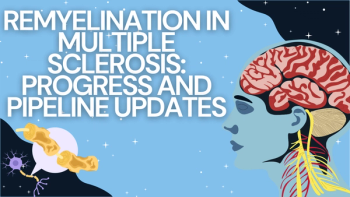
New long-term data reveals ponesimod's effectiveness in reducing relapses and MRI lesions in relapsing multiple sclerosis patients, ensuring safety over 8.2 years.

Marco Meglio, Assistant Managing Editor for NeurologyLive, has been with the team since October 2019. Follow him on Twitter @marcomeglio1 or email him at [email protected]

New long-term data reveals ponesimod's effectiveness in reducing relapses and MRI lesions in relapsing multiple sclerosis patients, ensuring safety over 8.2 years.

Neurologists advocate for personalized treatment approaches in older MS patients, emphasizing the importance of individual assessment over age-based rules for DMT discontinuation.

Fenebrutinib shows promising results in reducing relapse rates and disability progression in relapsing multiple sclerosis patients over two years.

A recent study reveals that patients on ofatumumab experience fewer worsening MS symptoms compared to those on ocrelizumab, enhancing treatment stability.

Cladribine shows promising results in reducing relapse rates for patients with relapsing multiple sclerosis after inadequate response to injectable therapies.

Test your neurology knowledge with NeurologyLive®'s weekly quiz series, featuring questions on a variety of clinical and historical neurology topics. This week's topic is on the Consortium of Multiple Sclerosis Centers (CMSC) Annual Meeting.

Explore groundbreaking therapies in development for Huntington disease, targeting its root causes and offering hope for improved patient outcomes.

A study reveals long-term fumarate therapy significantly reduces infection-related healthcare utilization in multiple sclerosis patients compared to anti-CD20 treatments.

Mind Moments®, a podcast from NeurologyLive®, brings you an exclusive interview with Taylor Hess, MD. [LISTEN TIME: 10 minutes]

Explore the latest advancements in remyelination research for multiple sclerosis, from stem cells to small molecules, and discover what’s on the horizon for therapeutic development.

New findings reveal ozanimod shows no significant rebound effect in relapsing MS patients after treatment discontinuation, ensuring safer transitions.

Research highlights the benefits of natalizumab during pregnancy for women with multiple sclerosis, showing reduced disease activity and improved outcomes.

The ongoing PERSEUS trial explores tolebrutinib's potential as a treatment for primary progressive multiple sclerosis, with results anticipated soon.

Jeff Smith, PhD, chief executive officer at Precision Biosciences, explained the clinical potential and gene-editing mechanism of PBGENE-DMD, a one-time therapy targeting dystrophin mutations in Duchenne muscular dystrophy.

New findings reveal ocrelizumab significantly improves symptoms, cognition, and fatigue in Black and Hispanic patients with relapsing multiple sclerosis.

The vice president and franchise lead of Autoimmune at Hansa Biopharma shed insights on imlifidase’s targeted mechanism and promising phase 2 data in treating Guillain-Barré syndrome.

Nuvig's NVG-2089 shows promise in CIDP treatment, offering a safer, more efficient alternative to IVIg with a patient-friendly trial design.

BioVie initiates a phase 2 trial for bezisterim, targeting neurological symptoms of Long COVID, aiming to improve patient quality of life.

Test your neurology knowledge with NeurologyLive®'s weekly quiz series, featuring questions on a variety of clinical and historical neurology topics. This week's topic is on headache/migraine presenting to the ER.

Investigators explore a phase 4 trial transitioning CIDP patients from IVIg to efgartigimod, aiming to enhance treatment safety and efficacy.

A recent study suggests rituximab may benefit CIDP patients, showing improvement in neurofilament levels and clinical outcomes after treatment.

New findings confirm vutrisiran's long-term safety and efficacy in treating hereditary transthyretin amyloidosis, enhancing patient quality of life.

Apnimed's AD109 shows promise in treating obstructive sleep apnea, achieving significant results in a landmark Phase 3 trial, paving the way for FDA approval.

Gene therapy arsa-cel significantly improves nerve function in children with late-infantile metachromatic leukodystrophy, outperforming traditional treatments.

Matched analysis from the IGOS dataset showed ANX005-treated patients had greater improvements in GBS disability scores over time compared with those receiving IVIg or plasma exchange.

Subgroup data from a phase 2 CIDP trial showed riliprubart maintained consistent efficacy and safety across patient demographics, disease characteristics, and prior treatment exposures.

Eplontersen showed promise in halting disability progression and improving gait speed in patients with hereditary amyloid polyneuropathy, according to recent study findings.

Among patients with severe Guillain-Barré syndrome, imlifidase plus IVIg resulted in improved mobility, strength, and disability scores, with sustained benefit over a 6-month time period.

Carba1 showed promise in preclinical models as a dual-action agent, protecting against chemotherapy-induced neuropathy while preserving anticancer efficacy and safety.

Presented at the 2025 PNS Annual Meeting, phase 2 ARDA data showed empasiprubart reduced IVIg retreatment risk and improved grip strength in patients with MMN.